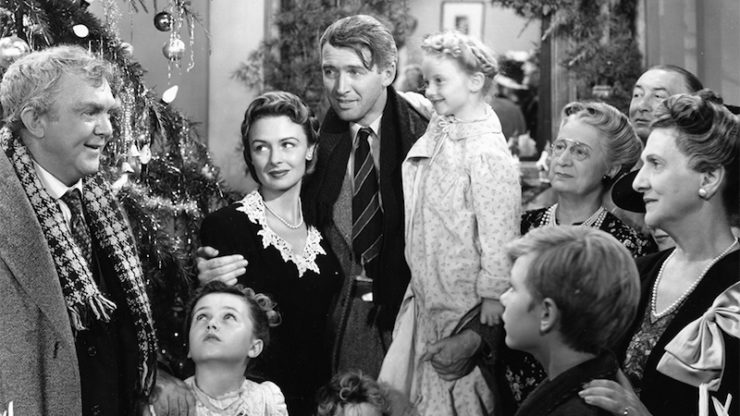Just after World War II two very different films were released, a bare year apart, that attempted to grapple with postwar America. It’s easy to look at It’s a Wonderful Life and either see a heartwarming classic or a pile of treacle begging for a snarky rejoinder, and it’s easy to look at The Bishop’s Wife and see mainstream Christmastime fluff. But both films hide a far more interesting message, which becomes clear when you compare them with other holiday classics.
One of Christmas’ greatest traditions is arguing about how far the holiday has fallen from the pure ideal Christmases of yesteryear. It’s too commercialized! It’s too materialistic! There is a war being waged upon it! And yet, when we actually look back at the history of our most beloved Christmas movies, we see that the holiday has always, with two big exceptions, been shown as a day of materialistic excess, glittery and expensive as Snoopy’s prize-winning doghouse.
How does Miracle on 34th Street end? The Real Santa Claus makes sure that adorable little Susan gets a nuclear family and the exact suburban house that she wants. (As a New Yorker, this ending horrifies me. You’re never getting that Fifth Avenue apartment back, girl—think about what you’re doing.)
A Christmas Story? The kid gets the toy he wants, after opening and being dissatisfied by an enormous (pre-War, end-of-the-Depression) haul under the tree.

National Lampoon’s Christmas Vacation? The entire plot is triggered by Clark Griswold’s boss’ decision to withhold Christmas bonuses, and the film ends with Clark not only getting the bonus, but also a sizable raise.
Home Alone? The insanely rich McCallisters pull the plug on their Paris vacation to come home and celebrate in their palatial estate with Kevin. (As of last year, that house was estimated to cost $2,103,245.13.)
White Christmas? A retired general’s poorly-thought-out real estate venture is saved.
Trading Places? An upper-class stockbroker, a broke conman, and a working-class sex worker team up to game the market—ending with all of them fabulously rich.
Elf? A fabulously rich children’s book editor (LOL forever) makes a killing publishing books about his long-lost son, who was raised by Santa’s elves.
Even the ur-Christmas story, A Christmas Carol, is not about a rich man giving all of his wealth away – it’s just about him learning to share it. The Cratchits go from poverty stricken to getting a Christmas windfall, and Bob’s promotion and raise almost certainly mean that the whole family will be solidly middle class by the time Tiny Tim is ready to woo—a huge deal in early Victorian England.
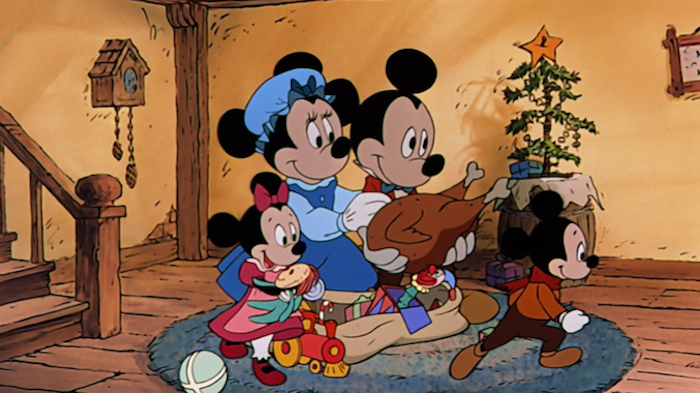
The Little Drummer Boy, gets a semi-happy ending from Rankin and Bass when it ends with a miraculous sheep-healing.
Emmett Otter’s Seasonal Depression Jamboree Jug-Band Christmas ends with Emmett and his mom getting a steady gig as a lounge act.
And what of the Grinch? That absolute gold standard for “presents do not equal Christmas,” ends with the Whos getting all their stuff back. Essentially, their joyful singing of Welcome Christmas” was exactly the catalyst for the Grinch returning their jing-tinglers and sloo-slunkers: the material stuff was the reward for transcending materialism.
And yes, a few of these movies nod toward being more giving and caring—Trading Places is explicitly about not judging a person’s intelligence by their social class, and Frank Cross gets his Scrooged lessons by learning to care for homeless people and traumatized children.
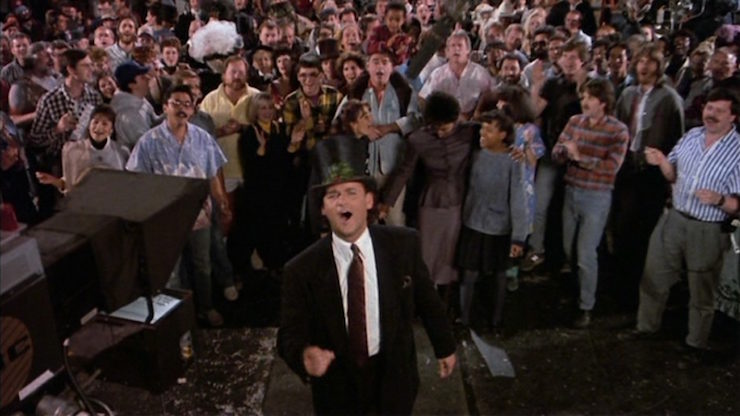
But.
They also all end with the protagonists in either the same comfortable financial situations as before, or even significantly better ones. These fantasies usually unspool while the protagonists are being told that Christmas is about more than presents—but everyone still gets presents or bonuses or better careers. Thousands of people who are racking up credit card debt, putting things on layaway, and doing serious financial yoga to make sure there are gifts under the tree end up sitting down to watch holiday classic together and seeing a goddamn avalanche of rich people. Or at least people who can heap presents under the tree with no outward concern.
The all-time classic It’s a Wonderful Life (1946), and a slightly less well-known Christmas classic, The Bishop’s Wife (1947), are the two films that don’t give in to this.
It’s a Wonderful Life was based on a story called “The Greatest Gift” (1943) by Philip Van Doren Stern. The short story is, first, very short at only 4,100 words, but second, not really focused on economics. A depressed man wants to kill himself, a shabby angel shows him what life would be like without him, he realizes he’s been an idiot and asks the angel to restore his life. There is a subplot about a bank robbery, but Mr. Potter isn’t a banker, he runs a photography shop.
The movie is about money at every level.
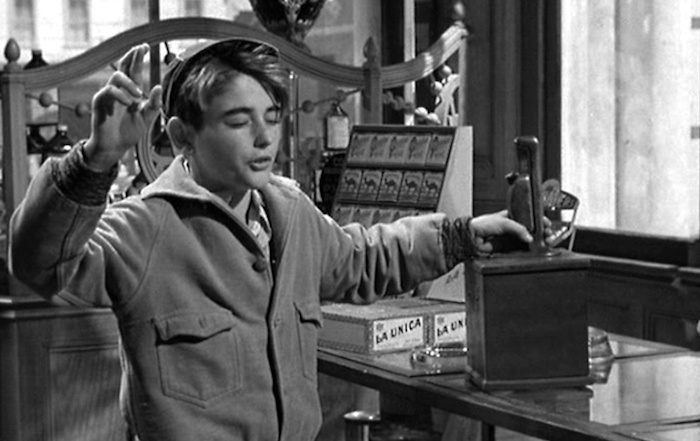
When young George lights the cigar lighter in Mr. Gower’s shop, he says, “I wish I had a million dollars!” as his dearest hope. (Let’s also note that George is already working when he’s what, 12 years old at most?) When he’s initially planning to go to Europe, he’s going to work his way across the Atlantic on a cattle boat, and has been “hoarding pennies like a miser” to be able to afford the trip and college after it. When Harry goes to college in his place so the family can keep the B&L afloat, George spends those four years years downsizing his dreams, but he still hopes to escape Bedford Falls, and when he brother returns George is looking through the want ads for manual labor gigs that will take him to oil fields or ranches across the country.
After George and Mary are married, we learn that he’s saved money for their honeymoon, but his ideals have eroded—and they’re bound up in wealth. No longer is he going to “build things” or even work with his hands in order to see a new part of the country, now he’s going to: “shoot the works. A whole week in New York. A whole week in Bermuda. The highest hotels. The oldest champagne. The richest caviar and the hottest music and the prettiest wife.” It’s not the time away from the grind, or the time with his wife he’s celebrating—it’s the markers of wealth that the two will enjoy during their two weeks away. Each time he makes a morally sound choice: saving the Building and Loan, giving Harry his college money, thwarting the bank run. But each time you can tell that he’s fallen a little further in his own estimation, if not in that of his wife, or friends, or children.
The whole battle throughout the film is between rich banker Henry Potter, and George Bailey, who starts out middle class (enough money for a comfortable house and a maid’s wages, but not enough money to send the boys to college) but seems to fall considerably throughout his own life (a ramshackle fixer-upper, no maid, old car, four kids to feed) until by the time he’s in his mid-thirties he seems considerably worse off than his father—even before the $8,000 loss that triggers his suicide attempt. George finds himself dedicating his life to his father’s business, the Bailey Building and Loan, which enables the poorer people of the town to take out home loans rather than live in Potter’s tenements, because Pa Bailey, and George after him, operate on the idea that those who believe that “do most of the working and paying and living and dying in this community” deserve to do it “in a couple of decent rooms and a bath.”
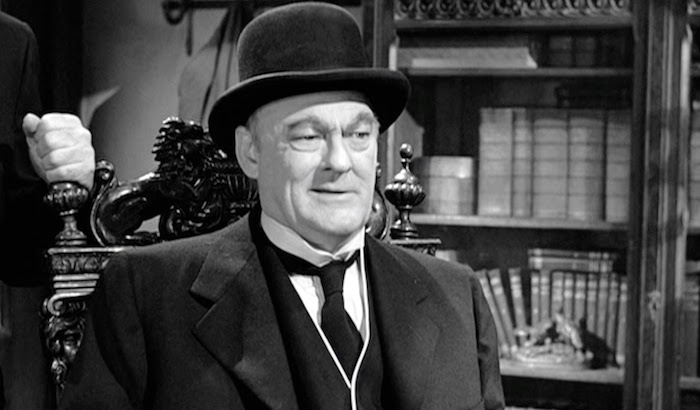
Potter, meanwhile, is a cartoon rich man with no moral compass, no ideology driving him, who sees the Baileys as dangerous idealists. But he’s not like the mayor in Footloose who wants to ban dancing, or the men of The Handmaid’s Tale who want to police women’s sexuality—Potter’s oligarchy is purely financial. The closest Potter gets to an ethos is the belief that if Bedford Falls’ working class have access to money it will warp them: “What does that get us? A discontented, lazy rabble instead of a thrifty working class. And all because a few starry-eyed dreamers like Peter Bailey stir them up and fill their heads with a lot of impossible ideas!”
When George goes groveling to Potter, the man breaks him down to a dollar amount—“Have you got any stocks? Bonds? Real estate? Collateral of any kind?”—and scoffs at George’s $15,000 life insurance policy when he learns that he only has $500 equity.
Five hundred dollars? And you ask me to lend you $8,000? Look at you. You used to be so cocky! You were going to go out and conquer the world! You once called me a warped, frustrated old man. What are you but a warped, frustrated young man? A miserable little clerk crawling in here on your hands and knees and begging for help. No securities –– no stocks –– no bonds –– nothing but a miserable little five hundred dollar equity in a life insurance policy. You’re worth more dead than alive.

And George, forgetting his family, his friends, the ideals that he inherited from his father, and which he has championed throughout the film, agrees with Potter. His life is worthless because his bank account is worthless. His first conversation with Clarence is marked with economic worries. Obviously he has no reason to believe Clarence’s claim to angelhood, and it would be pretty weird if he did, but even taking that into account, their first conversation is so based in George’s obsessions with money and appearances it shocked me watching it again this year:
George: Well, you look about the kind of angel I’d get. Sort of a fallen angel, aren’t you? What happened to your wings?
Clarence: I haven’t won my wings, yet. That’s why I’m called an Angel Second Class. I have to earn them. And you’ll help me will you?
George: Sure, sure. How?
Clarence: By letting me help you.
George: I know one way you can help me. You don’t happen to have 8,000 bucks on you?
Clarence: No, we don’t use money in Heaven.
George: Well, it comes in real handy down here, bud!
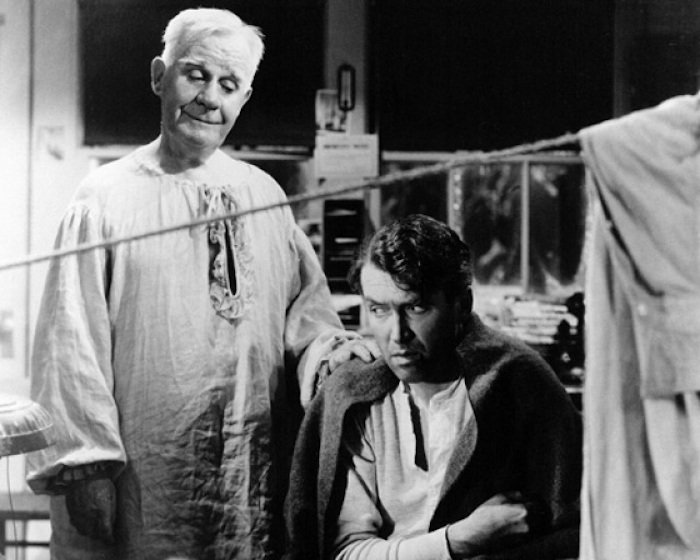
Now it’s become popular to trot out the idea that Pottersville is more fun than Bedford Falls, or even that it will be better off, financially, in the long run. But what always marks Pottersville for me is that self-respect, and respect for other people, is clearly in freefall here. Everything has been monetized and there is no room for deviation from the capitalistic norm. Uncle Billy’s locked up because his grief-fueled eccentricity can’t survive in Pottersville. Ma Bailey has to turn her home into a boarding house. Violet, whose freewheeling sexuality seemed to find a surprising amount of acceptance in Bedford Falls, has had to monetize her body in a much harsher way.
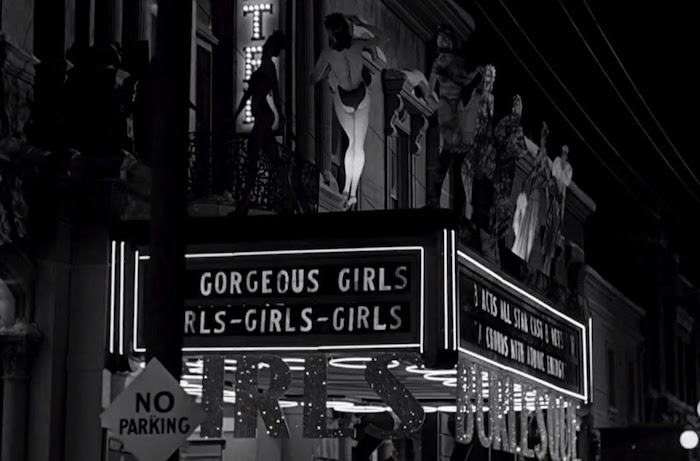
There’s no support system for Mr. Gower or the Martinis. Love and family can’t survive in the face of Ernie’s poverty. Mary Hatch, unwilling to go Violet’s route, has to take the only other role that this society will offer an unwed woman. There is no place for George Bailey or his father in this world, because here you’re either “rabble” scrounging up just enough money to survive, or, presumably, you’re getting rich from the rabble’s work. We don’t even see the rich of Pottersville, because George doesn’t socialize with their analogues in his own world. All of the people he cares about are considered worthless, replaceable cogs.
This is the message we expect from a work of populist cinema that was actually investigated by HUAC for possible communist messaging, so I was surprised to see a similar message show up in The Bishop’s Wife. In many ways an innocuous piece of Christmas-time fluff, The Bishop’s Wife centers on Henry Brougham, an Episcopal bishop who is extremely overworked and exhausted from his work trying to raise funds for a majestic cathedral. This has taken a toll on his family life—especially his marriage to the young and beautiful Julia. When he prays for guidance (literally says “show me the way”) an angel named Dudley is sent to help him.
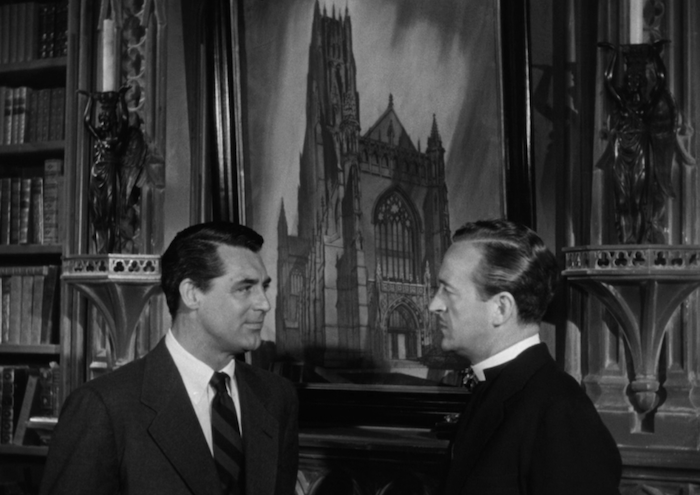
Rather than simply miracling a cathedral into existence, or inspiring rich people to shower the parish with money, Dudley simply acts as Henry’s humble assistant—at least, while other people are around. Every time Henry is alone with him, the angel challenges his ideas and lectures him, and when that fails, he begins to—there’s no other way to say this—seduce Henry’s lonely wife, Julia. Dudley “borrows” the scarf the family maid got for Henry’s Christmas present last year; he takes Julia to lunch at the restaurant where Henry proposed and then goes skating with her—essentially hijacking a date Henry had proposed; he befriends Professor Wutheridge, a friend from the couple’s youth; he starts spending quality time with Henry’s daughter. In the end, Henry realizes that his true treasure has been with him all along—the love of his family and friends.
The film could have stopped there and been a heartwarming, fantasy-tinged Christmas classic. Robert Nathan’s original 1928 novella doesn’t even go this far, and instead focuses on Julia’s dissatisfaction with her marriage and her romantic fixation on the angel. But the film goes in a different direction entirely. Henry isn’t the cold older man he is in the book—he and Julia were genuinely happy and romantic together once upon a time. And that time was when they were poor, working in a shabbier parish, and just making do on his salary as a priest. Julia and Professor Wutheridge muse on the earlier period in their lives in Wutheridge’s apartment, a tiny, cluttered two-room walk-up in a bad neighborhood. We visit Henry’s old church, St. Timothy’s, which is small and dilapidated, but whose members love it. The church’s choir is made up of scruffy boys who are about one scuffle away from being Dead End Kids, but when they sing together they turn into the Mitchell Boy Choir. The first hour of the film hints at its message, but it’s when we see Dudley alone that things really kick into high gear.
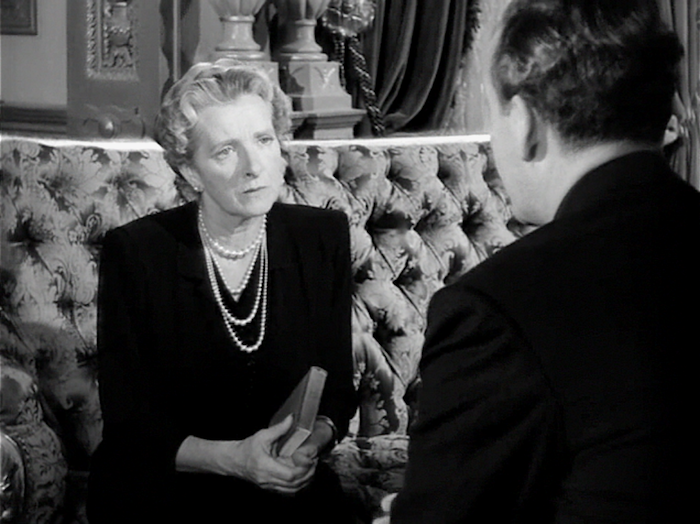
He waits until Henry is at yet another schmoozey meeting with rich people to enact the last part of his plan. He glances over Henry’s Christmas Eve sermon, considers it for a moment, then tosses it into the fireplace to burn, and begins dictating his own sermon directly to the typewriter, which magically types it up. We only hear the opening—something about an empty stocking and an aunt who wants an orange squeezer. Next he goes behind Henry’s back to visit Mrs. Hamilton, the rich woman who has been dictating the building of the cathedral, and seems to want it to reflect her late husband’s memory more than that of any saint.
Dudley does some angelic snooping and speaks with Mrs. Hamilton about her lost first love, a poor composer whom she rejected in favor of the rich George Hamilton. Mrs. Hamilton only married George because she feared poverty, and now she’s burning money to honor him with a church—not because she believes in the church’s mission, or wants to help build an edifice to the glory of God, or wants to create a place for people to worship, but only to assuage her own guilt over marrying for wealth. Once Dudley shows her this, she undergoes a complete Scrooge makeover. When Henry and Julia arrive at the Hamilton mansion for Christmas Eve dinner she embraces Julia, insists that both of them call her by her first name, and announces that she’s giving her money to the poor rather than to the cathedral fund. This turnaround stuns Henry, who believes that Dudley is a demon come to ruin his life.
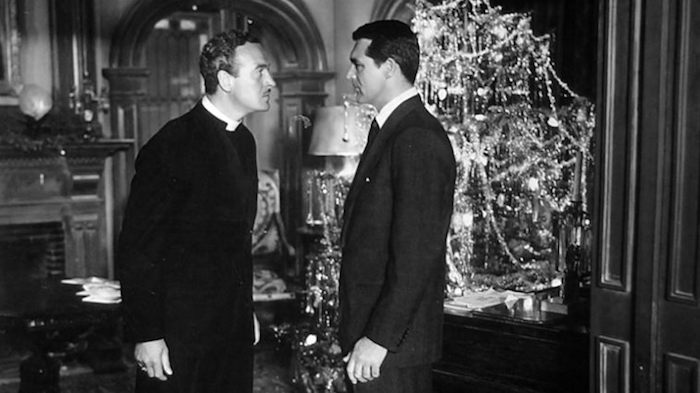
But Dudley points out that Henry asked to be “shown the way.” Nowhere in his prayer did he say “help me build a giant cathedral with a rich lady’s money.” Dudley then erases the family’s memory and heads off to his next assignment, and Henry delivers the sermon that Dudley wrote, believing it to be his own work.
Tonight I want to tell you the story of an empty stocking. Once upon a midnight clear, there was a child’s cry. A blazing star hung over a stable and wise men came with birthday gifts. We haven’t forgotten that night down the centuries; we celebrate it with stars on Christmas trees, the sound of bells and with gifts. But especially with gifts. You give me a book; I give you a tie. Aunt Martha has always wanted an orange squeezer and Uncle Henry could do with a new pipe. We forget nobody, adult or child. All the stockings are filled… all that is, except one. And we have even forgotten to hang it up. The stocking for the child born in a manger. It’s his birthday we are celebrating. Don’t ever let us forget that. Let us ask ourselves what he would wish for most… and then let each put in his share. Loving kindness, warm hearts, and the stretched out hand of tolerance. All the shining gifts that make peace on earth.
So what do these two films have in common? Tucked away in their white middle-class devotion to family and Christianity is a slightly more radical definition of Christmas than what usually makes it into the movies. The protagonists mostly don’t get what they want, and when they do, there are giant unforeseen consequences.
George and Henry both make off-the-cuff requests for giant things: non-existence and guidance respectively. Both of these requests are granted, but the way they’re granted forces the protagonists to look at their values, and how those values relate to money. George has to grapple with the fact that he has tied his sense of self-worth so completely into a dollar value that when he loses money and is told by an cranky rich bastard that he’s “worth more dead than alive”, he agrees and marches right off to the nearest bridge. Henry comes to realize that he, a man of God who is responsible for the moral lives of everyone in his parish, became so caught up in proving himself with the cathedral project that he alienated his family and expected a divine being to act as his financial advisor. Rather than offering moral leadership and unconditional love, he allows his role as bishop to be defined by a rich elitist, and his marriage to be compromised by his pursuit of a physical monument rather than an emotional or spiritual one. Instead of looking at the cathedral project and realizing, as Dudley says, “That big roof could make so many little roofs,” he charges ahead, and it takes divine intervention to stop him.
In both films the idea that “Christmas, perhaps, means a little bit more” is not immediately followed up by an affirmation of materialism. Sure, George has enough to cover the $8,000 loss—but he’ll need to pay all of it back, right? Sam Wainwright agreed to advance him up to $25,000, which means that George will have to somehow live even more frugally to make sure that he can get everyone their money back. The bank examiner joined in the singing, and the cop tore up the warrant for George’s arrest, but do you really think Potter’s going to let him off that easy? He’s still on the board of the B&L. He can still get George fired, or jailed, and if anything the rabble coming to George’s rescue is going to make the old man hate the Baileys even more, so this is, at best a temporary happy ending, materially speaking.
Meanwhile, Henry doesn’t get his cathedral, and The Bishop’s Wife ends with a reminder that none of the rushing around and shopping and decorating matters at all—Christmas is supposed to be about love, kindness, and, (most interesting to me look at a film from 1947) tolerance. The characters are happy because they’ve been divinely mindwiped, but the audience knows that Henry didn’t get what he wanted, that Julia was kind of emotionally unfaithful to her husband, and that Dudley himself has fallen in love with Julia, and left (extremely reluctantly) to preserve cosmic order and ensure the Broughams’ happiness.
I’m not saying this to bum you out—quite the opposite. The films have to have these notes of discord to highlight their messages. These two films re-center the Christmas story in a way that strips all of the trappings away and shows us that American Christmas, even in our fictional lily-white conservative postwar past, was always about cash on the nail—and that we should question that fact constantly. If a man as good as George Bailey can’t detangle his sense of self-esteem from his financial status, where does that leave the rest of us? If a bishop puts his entire life at risk to flatter and placate rich people, what hope does a regular street-level heathen like myself have? I’m not such a starry-eyed idealist that I think societies can function without money, but is it too much to ask that we define ourselves by our morality, our care for others, our artistic work, rather than a number in a bank account? And maybe more Christmas films could posit the idea that maybe, perhaps, Christmas—and human life—mean a little bit more?
Having said all this, Leah Schnelbach still hopes to find a present or two under her tree—she’s only human. Come sing fah-who-for-aze with her on Twitter!










